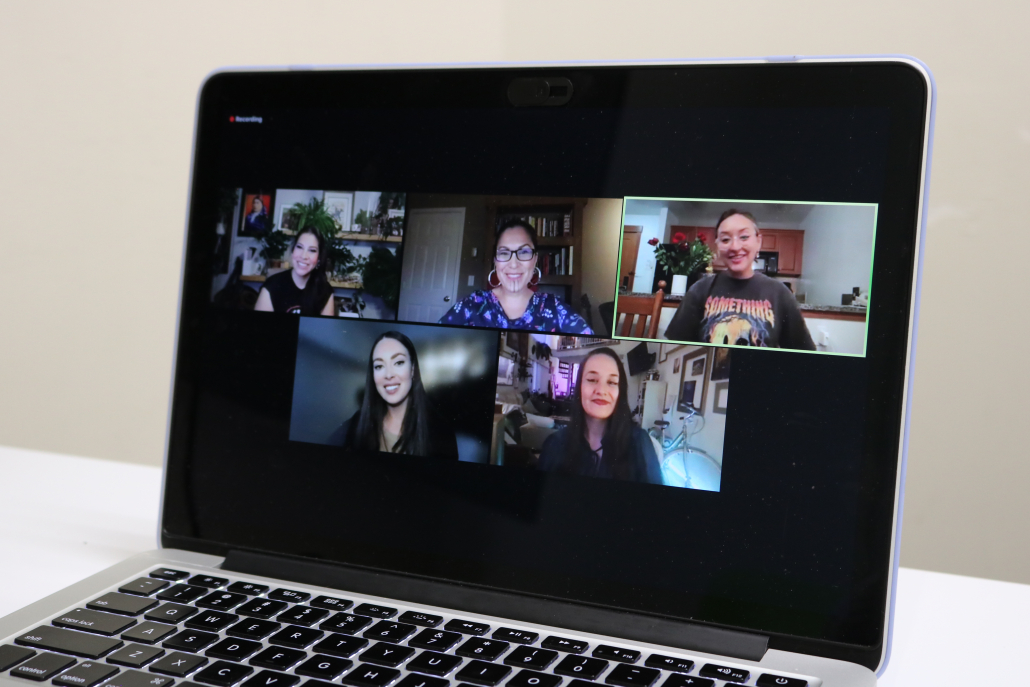Indigenous women share media industry experiences

Excitement was tangible in the Zoom webinar as L.A. Skins Fest: Native American Women in Media panelists logged on for a night full of conversation about representation and inclusion. The event brought attendees across the United States Monday night to learn more about the experiences of Native American women in the film and television industry.
The collaborative effort between the School of Cinematic Arts, Visions and Voices and L.A. Skins Fest — the latter described as “a film festival that provides opportunities for Native American filmmakers and offers additional programming to encourage them” — featured an impressive array of panelists ranging from filmmakers to actors. Alyssa London, founder and CEO of Culture Story, a company that creates media content that embraces the vitality of Native and Indigenous cultures, moderated the event and introduced the speakers.
Tazbah Rose Chavez, a writer, producer and episodic director for the hit TV series “Reservation Dogs,” Princess Daazhraii Johnson, creative producer of the Peabody Award-winning PBS KIDS series “Molly of Denali,” Kelly Lynne D’Angelo, a writer for “Miracle Workers,” “Spirit Rangers’’ and “Final Space,” and Cara Jade Myers, a writer and actor recently cast in one of Martin Scorsese’s next films, “Killers of the Flower Moon,” were the esteemed panelists for the event.
The importance of community was tangible from the beginning as attendees witnessed the camaraderie and friendship among the panelists. They bantered back and forth. sharing connections, stories and anecdotes that tied them together by more than just their shared cultural background and heritage.
One of the highlighted topics throughout the night was the idea of “narrative sovereignty.” Johnson introduced the idea at the beginning of the panel and spoke to the importance of Native people telling Native stories.
“I just think that, so often we have people from outside of our community coming in to tell our stories, and we need to build the [Native American presence in the industry] because having that narrative sovereignty and having our indigenous lens is so critical,” Johnson said.
Johnson’s fellow panelists agreed. Myers shared her own experiences on sets lacking Native American talent while trying to tell Native American stories where they would push inaccurate stereotypes. Myers also ascribed a different level of ease to telling stories about the Native American experience with a Native American team.
“I love working with other Natives because there is a certain trust that what they’re writing, or what they’re doing or what they’re saying is authentic versus someone just being like ‘Oh and now she wears a headdress because it’s a ceremony,’ and you’re like ‘no, I don’t,’” Myers said.
Myers also described her experiences on the set of “Killers of the Flower Moon” and expressed her relief at the openness white department heads demonstrated when she told them a cultural practice wasn’t depicted correctly in the film. But, when you are responsible for answering for an entire diverse community, it can be difficult, Myers said. She described the challenges of being the only Native talent on set, where you’re given a whole other job in addition to the one you have in the project.
“I find a lot of times when you’re one of the few Natives, then you’re constantly having to be the advocate, the teacher and you have to be the consultant, so you’re constantly wearing multiple hats,” Myers said. “If they have a Native American question they come to you.”
D’Angelo also spoke to the ease of working with an Indigenous team. She explained how, when working with people from your own community as collaborators, there is a kind of “veil” that is lifted. Being surrounded by fellow Native Americans allowed her to feel as though she can simply be. There’s a whole conversation that doesn’t need to be had by virtue of their shared heritage and experiences that non-Native creators are unable to relate to, D’Angelo said.
“It just makes it easy,” D’Angelo said. “It’s like pedaling down the chillest stream in the world instead of going through one during a turbulent storm.”
The importance of representation was emphasized by all panelists. Chavez, in particular, shared how essential representation is for her when it comes to incorporating the Native American experience in all narratives, whether being Native is central to the plot or not.
“[Representation] absolutely is the guiding light and North Star of my career path. I am most interested in telling indigenous female stories and inserting those perspectives into any show I’m a part of whether it’s Native or non-Native, and that’s something [I never] shy away from discussing,” Chavez said. “I don’t see myself tiring of that because there’s such diversity in our stories across our nations that I don’t think centering the indigenous female narrative is going to grow old.”
Even with the progress made for Native American filmmakers and actors recently, London said the film and television industry is still full of rejection. But, for Myers, it was her stubbornness and determination that saw her through those difficult times.
“I just made the decision that I’m going to be in the entertainment industry no matter what because I love storytelling,” Myers said. “And, of course, Native Americans are so underrepresented that it seems so important to me to keep going because, if I give up, then it’s like that’s just one less person that could be on TV that I never saw growing up.”
D’Angelo closed out the event with a discussion on the importance of intersectionality when representing the Native American community.
“We all exist, we are dynamic,” D’Angelo said. “There are things that we need to start telling stories about, but we are just starting and that’s what’s so exciting and thrilling. But we’re getting there, one step at a time, one conversation at a time, one show at a time, one story at a time.”

